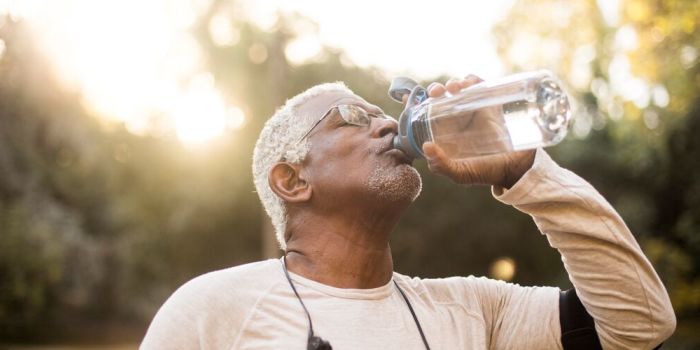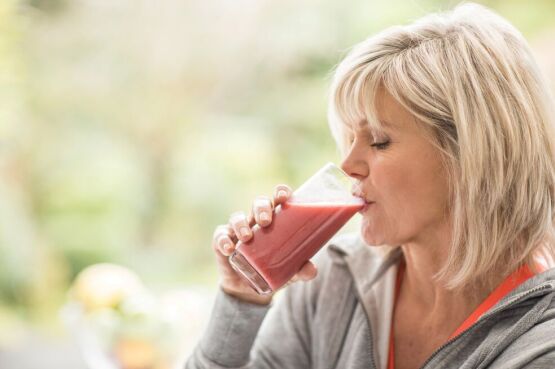What should I drink to stay hydrated?
Water is essential for life. It helps with everything from transporting nutrients around your body to controlling your temperature. It can even help you to have healthier skin.
Here, I’ll explain why you need to drink enough fluids, and share some tips on how you can stay hydrated.

How much should I drink?
Most adults need about 2 to 2.5 litres of fluid a day, which is around 8 glasses. You get most of the fluid you need from drinks, but some also comes from the foods you eat, such as soups, stews, fruit, and vegetables.
You need to make sure that you replace the amount of fluid your body loses each day. This will stop you getting dehydrated.
You lose about 1.5 litres of fluid a day when you pee, about 200ml in your poo, and about 500ml when you sweat. You also lose fluid just by breathing.
The exact amount of fluid you need depends on the following.
- Your age. As you get older your body stores less water and your kidneys don’t work as well as they once did.
- The amount of physical activity you do. The more exercise you do, the more you’ll need to drink.
- The climate and your environment. You need to drink more if it’s hot and you’re sweating a lot.
- If you’re pregnant or breastfeeding. You’re more likely to develop constipation, so you need to drink more.
What should I drink?
When choosing what to drink, think about the activity you’re doing and what your body needs. For example, if you’re doing light housework, then a glass of water may be all your body needs to stay hydrated. But if you’re taking part in more demanding activities like running long distances and sweating a lot, then you might benefit from a sports drink.
Any non-alcoholic drink can be part of the two litres that you’re aiming to drink every day. As well as giving you fluid, some drinks will also provide vitamins and minerals.
When you’re choosing what to drink, it’s worth remembering that some drinks such as fruit juice, can contain lots of calories and sugar too. Drinks that contain lots of sugar can cause you to put on weight and increase your chances of developing type 2 diabetes. Sugary drinks can also cause tooth decay.
One glass of fruit juice (150ml) can make up one of your 5 portions of fruit and vegetables a day. Any more than this can lead to weight gain and excess sugar intake.
Water
Water is a good choice when it comes to meeting your body's needs for fluids. It doesn't have any calories and if you drink tap water – it’s free. If you don’t like the taste then you can add a slice of lemon or a little sugar free cordial.
Fizzy drinks
Fizzy drinks can contain more calories and sugar than you might think. Some fizzy drinks can contain the equivalent of up to 12 teaspoons of sugar. If you can, choose no added sugar, low-calorie, low-sugar, diet, light or zero versions of fizzy drinks and cordials.
Milk
Milk is a good choice because as well as having water in it, it also contains protein, B vitamins, iodine and calcium. If you can, choose semi-skimmed or skimmed options to keep the fat content low.
Tea and coffee
Tea, as well as coffee can also be part of your fluid intake. Both have caffeine in them, which is a mild diuretic. That means they might make you pee more. If you stick to the recommended limits for caffeine each day, it shouldn’t affect how hydrated you are.
Does alcohol count?
Although technically alcoholic drinks contain water, they’re also diuretics. This means they make you pee more and that can cause dehydration, especially if you drink a lot in one go. It's a good idea to drink water or other low sugar or diet soft drinks alongside alcohol and to stay within safe weekly alcohol limits by drinking sensibly.
What should I do if I become dehydrated?
If you think you may be dehydrated, start by drinking more fluid. For mild dehydration, drinking water or other drinks may be all that you need to do.
If you have more severe dehydration because of diarrhoea or vomiting, you’ll lose important salts and sugars from your body as well as water. If you’re older or have other health conditions, your doctor or nurse may suggest you use oral rehydration therapy as well. This is usually a powder that you mix with water which contains sugar and salts.
If you think you may have severe dehydration, speak to your pharmacist straightaway.
Can you drink too much water?
You might have heard stories about people drinking too much water, but this is rare. Drinking a lot more than the recommended amount each day can cause very low levels of salt and other important electrolytes in your body.
So, it’s a good idea to stay hydrated, but not to consume any more than the recommended 2 to 2.5 litres a day.
-
Sources Sources
- Fluid (water and drinks). British Association of Dietitians. www.bda.uk.com, reviewed January 2023
- Human nutrition: water. Encyclopaedia Britannica. www.britannica.com, accessed 19 September 2023
- Healthy hydration guide for adults and teenagers. British Nutrition Foundation. www.nutrition.org.uk, last reviewed 2021
- Skin health – food fact sheet. British Dietetic Association. www.bda.uk.com, Last reviewed April 2020
- Electrolytes and Fluid balance. Oxford Handbook of Nutrition and Dietetics (2 ed.) oxfordmedicine.com, last accessed 19 September 2023
- Best practice guidance. Food and nutrition in Care Homes for Older People. Welsh Government. gov.wales, last accessed 19 September 2023
- Constipation. NICE Clinical Knowledge Summaries. cks.nice.org.uk, last revised January 2023
- Preventing excess weight gain. National Institute for Health and Care Excellence (NICE). www.nice.org.uk, accessed 19 September 2023
- Consumption of sweet beverages and type 2 diabetes incidence in European adults: results from EPIC-InterAct. Diabetologia 56, 1520–1530 (2013). doi.org/10.1007/s00125-013-2899-8
- Sugars and dental caries. World Health Organisation. www.who.int, accessed 19 September 2023
- Diet and my teeth. Oral Health Foundation. www.dentalhealth.org, accessed 19 September 2023
- Hashem KM, He FJ, Jenner KH, et al. Cross-sectional survey of the amount of free sugars and calories in carbonated sugar sweetened beverages on sale in the UK. BMJ Open 2016;6 doi:10.1136/bmjopen-2015-010874
- Caffeine risk assessment. European Food Safety Authority. www.efsa.europa.eu, accessed 19 September 2023
- Nutrient analysis of fruit and vegetables. Department of Health. www.gov.uk, accessed 19 September 2023
- Dehydration. Medscape. emedicine.medscape.com, accessed 19 September 2023
- Gastroenteritis – management in adults. NICE Clinical Knowledge Summaries. cks.nice.org.uk, accessed 19 September 2023
- Electrolyte replacement therapy. British National Formulary. bnf.nice.org.uk, last updated March 2020
- Hyponatraemia - complications. NICE Clinical Knowledge Summaries. cks.nice.org.uk, last revised March 2020
- Healthy eating for children: Food Fact Sheet. The Association of UK Dietitians www.bda.uk.com, reviewed October 2021
- Dairy and alternatives. British Nutrition Foundation. www.nutrition.org.uk, last reviewed 2022
About our health information
At Bupa we produce a wealth of free health information for you and your family. This is because we believe that trustworthy information is essential in helping you make better decisions about your health and wellbeing.
Our information has been awarded the PIF TICK for trustworthy health information. It also follows the principles of the The Information Standard.

More general health advice articles
Did you find our advice helpful?
We’d love to hear what you think. Our short survey takes just a few minutes to complete and helps us to keep improving our healthy lifestyle articles.
Legal disclaimer
This information was published by Bupa's Health Content Team and is based on reputable sources of medical evidence. It has been reviewed by appropriate medical or clinical professionals and deemed accurate on the date of review. Photos are only for illustrative purposes and do not reflect every presentation of a condition.
Any information about a treatment or procedure is generic, and does not necessarily describe that treatment or procedure as delivered by Bupa or its associated providers.
The information contained on this page and in any third party websites referred to on this page is not intended nor implied to be a substitute for professional medical advice nor is it intended to be for medical diagnosis or treatment. Third party websites are not owned or controlled by Bupa and any individual may be able to access and post messages on them. Bupa is not responsible for the content or availability of these third party websites. We do not accept advertising on this page.






